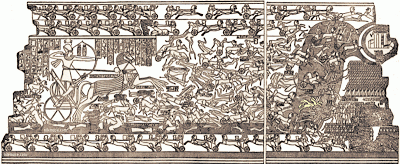Mythical
Victory
 |
| Relief of Rameses II at Kadesh |
In c. 1274 B.C.E., Rameses II, Pharaoh of Egypt engaged in battle with the Hittite King Muwatallis II at the city of Kadesh in modern day Syria. The resulting battle can only be described as a serious defeat for the Egyptian forces. But in an example of propaganda and the use of the big lie Rameses managed to largely successfully portray his defeat has a victory and to throw such dust into people’s critical faculties that still to this day people think of the battle has a tie or a draw at worst.1
What it was, was a serious, indeed
disastrous defeat.






